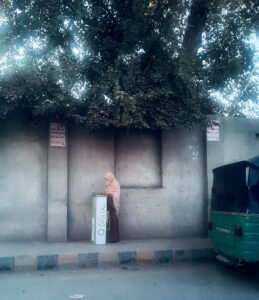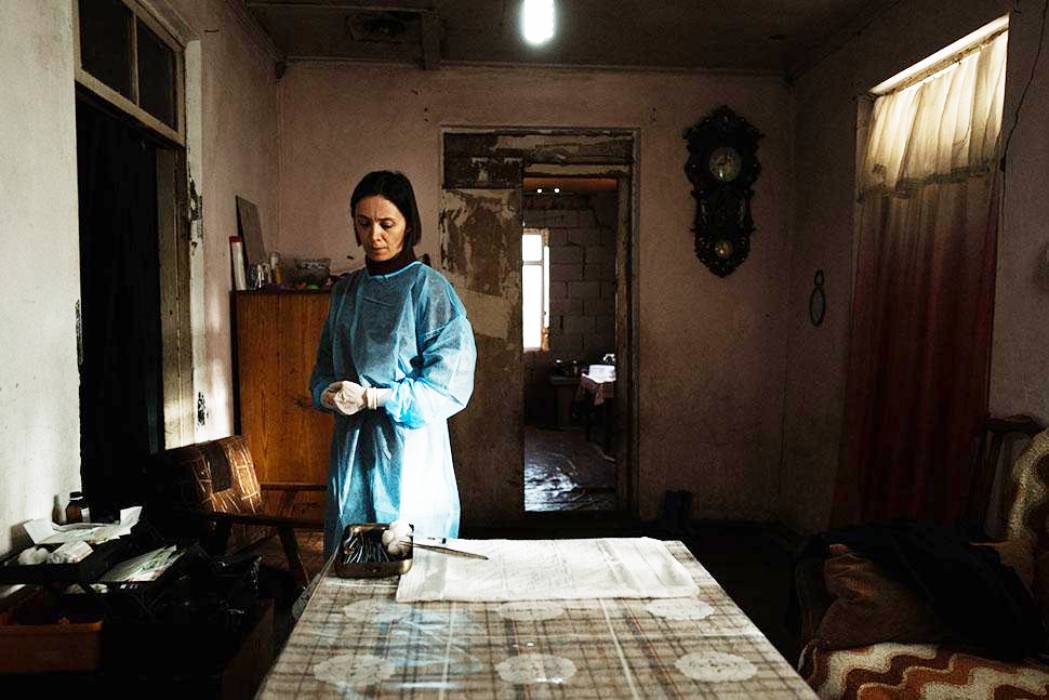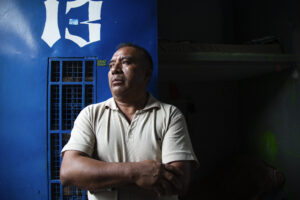

April is soundtracked by breathing. Deep, unsteady, heavy, stressed. Writer-director Déa Kulumbegashvili’s fiercely uncompromising film about the limited reproductive choices afforded to women in the Eastern European country of Georgia dedicates much of its sound design to the physical strain brought on by the consequences of defying these constraints.
Expert obstetrician Nina (Ia Sukhitashvili), whose ragged breaths are often a harsh counterpoint to the film’s long stretches of silence, has every reason to be tense. When one of the babies she helps deliver is stillborn, she finds herself the target of a hospital investigation demanded by the furious, grieving father. What he’s heard rumours of—and what the audience soon discovers to be true—is that Nina performs illicit home abortions in the country’s villages. This calls her character into question and is likely to influence the ruling, putting her livelihood at risk.
But what begins as an inquiry into a single tragic case gradually unspools wider questions about the ethics and morality of the law itself, particularly when it’s at odds with a woman’s right to exert control over her own body. Contrasting against April’s carefully composed shots is this underlying emotional churn.
Women officially can obtain an abortion until 12 weeks, according to Georgian legislation. Technically, however, it’s impossible. Clinics have the authority to decide whether they want to carry out the procedure, and since most of them don’t, especially in rural areas, this forces women to go to the capital. Financial constraints are not the only barrier. “There’s a huge stigma,” Kulumbegashvili said. “These women can’t even tell their husbands that they’re pregnant and that they don’t want the child.”
In April, the country’s vast open spaces are in stark contrast to its atmosphere of repression, its women’s lack of freedom, and the cloaked secrecy of the procedures Nina performs. Cinematographer Arseni Khachaturan lingers on rural Georgian landscapes—flowers billowing gently in the breeze, gorgeous red-and-blue streaked skies, gathering storm clouds—as Nina travels through them on the way to her patients.
These vistas also offer some respite from the almost-overwhelming heaviness of the doctor-patient conversations. In one scene, Nina offers contraceptive pills to a 16-year-old who isn’t ready to be a mother despite her 17-year-old husband wanting a child; she’s been desperately washing herself with laundry soap in the hopes that it will prevent a pregnancy.
Another case follows a woman who assumes her pregnant teen daughter has been sneaking out. “I swear, I don’t know who got her pregnant,” she says. The devastating revelation that comes towards the end of April is that the teen is mute, had been sexually abused by a family member, and has now been murdered. What use is Nina’s painstaking work to provide women with a safe space when the world, and even their own homes, are this hostile and inhospitable?
“Even though April is a work of fiction, it’s based on absolute truth,” said Kulumbegashvili. Scenes and dialogues were not only born out of observation at the local hospital, but also her travels through Georgia’s villages, where she was invited into homes by women eager to talk to her. “The film is a manifestation of generosity,” she added.
Sometimes, Kulumbegashvili saw women with as many as eight children, living in absolute poverty, without running water or a washing machine. Most of these women couldn’t read or write, had never been educated or held a job, and couldn’t teach their children either.
The situation isn’t poised to improve. Recently, Georgia’s parliament broached the idea of a woman requiring her husband’s permission to have an abortion.
Nina’s harrowing experiences mirrored the “unpleasantness” of Kulumbegashvili’s shoot. At one point, the local police began following the crew. “This is my home, this is where I grew up, my family lives there,” Kulumbegashvili said. “To be back at home and raising suspicion just because you are making a film is surreal, because you’re not doing something wrong or illegal.”
Yet she knows that the act of bearing witness and documenting is unwanted. “People with cameras pose a threat,” Kulumbegashvili noted. “Because you see and film things that people don’t want you to see.” Applying for funding to make April in the first place was out of the question.
Still, she kept at it, with the support of the local community she’d been forging relationships with since 2016, shooting a short film and then her feature debut, Beginning (2020), in the region. This intimacy led to one of April’s most striking scenes—a live birth captured on camera, in full view, in real time. There are no neat cutaways from the gruelling reality of the process. It’s a sequence crucial to the film, the very delivery that spurs the investigation into Nina.
The conceit of the scene started as a joke. “This is a film that’s very much about the female experience,” Kulumbegashvili said. “But obviously, we couldn’t just go to the clinic and say: This is what we want to shoot, now how do we do it? I wasn’t even talking about it.” Having spent a year at the local clinic, she’d befriended the women who’d come to register their pregnancies there. They began teasing, “Maybe you should film this too.”
The crew prepared for months, kept a rigged overhead camera on standby at the hospital, and rushed there as soon as they got the call. “I didn’t have to convince anyone of anything; there was this excitement we all shared,” Kulumbegashvili recalled. “These women at the maternity clinic understood me better than some film professionals did.” On set, consulting doctors taught lead actor Sukhitashvili how to perform the procedures convincingly.

Despite its stark imagery, April is also about what viewers don’t see. Kulumbegashvili grants her female characters a measure of dignity that the world refuses to, often framing their faces out of the shot as if adopting a doctor-patient confidentiality, preserving their privacy. One static, unbroken 10-minute-long single shot follows Nina performing the mute teen’s abortion in real time. The girl lies atop her dining table, her face shielded from view by her mother in front of her as Nina gets to work, only her abdomen and legs visible. Later in the film, it’s jarring to see a male family member having dinner at the same table, utterly oblivious to what has transpired there earlier.
When Kulumbegashvili’s producers read the abortion scene in the script, they were put off. “What are the viewers meant to look at [for so long]?” they asked her. “They’re looking at exactly what’s described,” she responded. By not cutting away from the character’s pain and discomfort, voiced only through her cries, she not only elicits sympathy for the desperation of her circumstances but also emphasizes the full scope of what Nina’s high-risk job entails.
The assembly cut was a “disappointing experience” for male viewers. “Many people didn’t want to see how we’re born,” said the director. It sparked something of an internal “protest”, demanding that scenes be cut shorter. Male collaborators were inclined to view childbirth as mysterious, while women saw it as a matter-of-fact. “I didn’t want to make an entertaining film,” said Kulumbegashvili, who herself gave birth during post-production and wanted April to be immersive and remain true to the female experience. “Abortion is never just one thing to different women—every woman talks about it differently.”
For Nina, performing one is almost a compulsion, the urgency of which Kulumbegashvili evokes through not only words but also unsettling surrealistic imagery that ruptures the film’s vérité style. Nina recounts that when she was on vacation as a child, her sister got stuck in the mud by a lake; paralyzed by fear, she could neither leave to get help nor wade into the mud herself to pull her out.
In some of April’s more fantastical moments, an elderly, emaciated naked woman lurks in the Georgian countryside, then creeps into the corners of Nina’s house. Is this eerie figure a projection of her lingering childhood guilt and helplessness? A haunting reminder that she failed to act decisively then, and is now in a position where she must? Kulumbegashvili is elusive about the answers. “I don’t want my films to be shocking or provocative,” she said. “I want to leave space for empathy. That’s the whole reason I make films.”
For all of Nina’s authoritative status, however, April is filled with sobering reminders of its fragility in a male-dominated world. A sense of danger spills over from her furtive secondary profession and into her clandestine personal choices, the long nighttime drives on which she picks up men. For someone who constantly brings life into this world, Nina is remarkably reckless with her own. Her loneliness, the cultivated result of keeping people at arm’s length, is palpable. A shot of dogs running free and wild is juxtaposed against several of her alone in the gnawing silence of her apartment.
April premiered at the 2024 Venice International Film Festival, where it won the Special Jury Prize, has been part of the MAMI Mumbai Film Festival 2024 lineup, and was recently released in American theatres. But the tragedy of this film, filled with stretches of silence that emphasize the weight of emotions unable to be articulated, is that it’s been silenced in its own country of origin.
“April is not only banned in Georgia, it doesn’t exist. They don’t even need to officially ban it because the distributors’ self-censorship is so strong,” said the director. “Film communities won’t talk about it.” T.S. Eliot once referred to April as the “cruellest month,” but it rarely appeared as dismal as it does in Kulumbegashvili’s sophomore feature, a bleak, unsparing reflection of the world around her.





